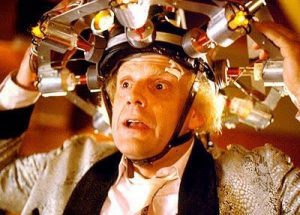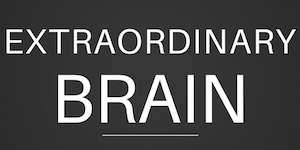When I was at the Cleveland Clinic, my doctor suggested I try both EMDR and neurofeedback training. We will set EMDR aside for now. But, what the heck is neurofeedback training?
 When I first heard the words, I envisioned some sort of 1960s science experiment where the subject has electrodes glued to their head or maybe Doc Brown from Back to the Future.
When I first heard the words, I envisioned some sort of 1960s science experiment where the subject has electrodes glued to their head or maybe Doc Brown from Back to the Future.
Well, that’s not too far from the truth.
What is neurofeedback?
NFB (sorry I’m getting tired of typing NeuroFeedBack), is basically when you connect a bunch of electrodes to your head and those electrodes detect your brain waves. The brain waves are feed into a computer that interprets them and then provides some sort of feedback signal to the brain like audio or video or both.
This essentially allows the brain to ‘observe’ itself in action.
We all know that the brain is very adaptable. So with this feedback, the brain is able to adjust how it’s working. The feedback trains the brain to work in a different way. That’s why it’s referred to as neurofeedback training.
That’s a pretty rough overview, but I’ll probably come back and give you a better description later.
For now, I just want you to know that this is what I’m starting out with. Well, more specifically. I’m starting out with Neuroptimal Neurofeedback Training.
You see, there are many types of neurofeedback and as my Cleveland Clinic doc warned me, some are better than others and there are even some that if done improperly can cause damage.
According to my research, Neuroptimal is super safe. In fact, it’s pretty much on autopilot so there isn’t much room for practitioner error that could damage my brain. I like that 🙂
The Neuroptimal website says:
Our clients typically find NeurOptimal® neurofeedback systems effective in resolving issues in five general categories:
• Wellness and Personal Growth
• Slowing the Effects of Brain Aging
• Achieving an Artistic or Athletic Performance Edge
• Help with Specific Cognitive, Emotional, or Physical Challenges (e.g., ADHD, anxiety, chronic pain)
• Enhancing Academic Performance
Now, that’s pretty general, but I know that with these sorts of things they can’t always make health claims. So, I’ve read lots of reviews and searched online to find a practitioner near me.
Referring to Neuroptimal, the website for the practitioner I plan to see says:
My Neurofeedback system is one that allows the brain to get a glimpse of its own activity and if there are areas of turbulence or underactive areas, the system will retrain that area of the brain improving neuroplasticity. This method helps those who eat for emotional reason’s reducing the brains input into the emotional need, allowing better control with eating. Neurofeedback helps improve sleep, decrease anxiety and depression, better manage ADD/ADHD, reduce the effects from chemo-brain and minimize symptoms of PTSD….to name a few. With a few leads on the ears and scalp, the session is 35 min of listening to specially designed ethereal music. It is encouraged that one fall asleep during the session as the conscious brain is “off-line” therefore allowing the brain to tend those areas of the brain that need “mopping up.” Many mention that sleep and anxiety begin regulating within 2-3 sessions, while those with ADD/ADHD may notice changes by the sixth session. Bio-individuality applies here and change is dependent upon each unique person and severity of symptoms.
This is also very general and doesn’t feel super scientific to me. However, in looking around forums, I have definitely found several success stories from people using neuroptimal in particular and NFB in general.
In talking with the practitioner, she told me about some reasons to use Neuroptimal:
NF has been around for over 50 yrs…the old method is cumbersome with a long diagnostic process and tendency towards error adjustments. The system I have allows the brain to make it’s own changes; returning to it’s more intrinsic function. Anyone with a brain undergoing NeurOptimal will have benefit.
Here are some of the clients and the benefits: Many with ADD gain focus and reduce or get off meds, heal toxic mold injury to brain, heal chemo brain and nerve pain residual, improve performance and agility in soccer and football, heal chronic complex migraine, heal PTSD and reduce anxiety and depression, heal ringing in the ears. Nearly everyone experiences more restful sleep ( I call it “efficient sleep”)…… the list goes on and is pretty incredible.
Improved sleep would be amazing! I never really feel very well rested.
I followed up with some of the benefits that I’m looking for:
I’m hoping to get help from NF with my memory, focus, energy, mood. You mentioned tinnitus, that’d be great too 🙂Do these sound like things that NF will help?
And her reply was encouraging:
Yes, NeurOptimal will absolutely improve your situation. Regarding the tinnitus…it depends on the type, what the cause of it is (can be environmental) and how long you have had it. I had one case resolve completely.It is usually recommended to get at least 6 sessions. They can be done once a week. I have done many consecutive days. It depends on your situation and how you feel about it. It seems with the younger folks 😉 days in a row or multiple times a week is beneficial.
I’m going to give it a go in the hopes that this will work on me. I’m hopeful, but also slightly skeptical. Maybe my experimentation will help you decide if you should give Neuroptimal a try.
I’ll keep you updated on my progress.
